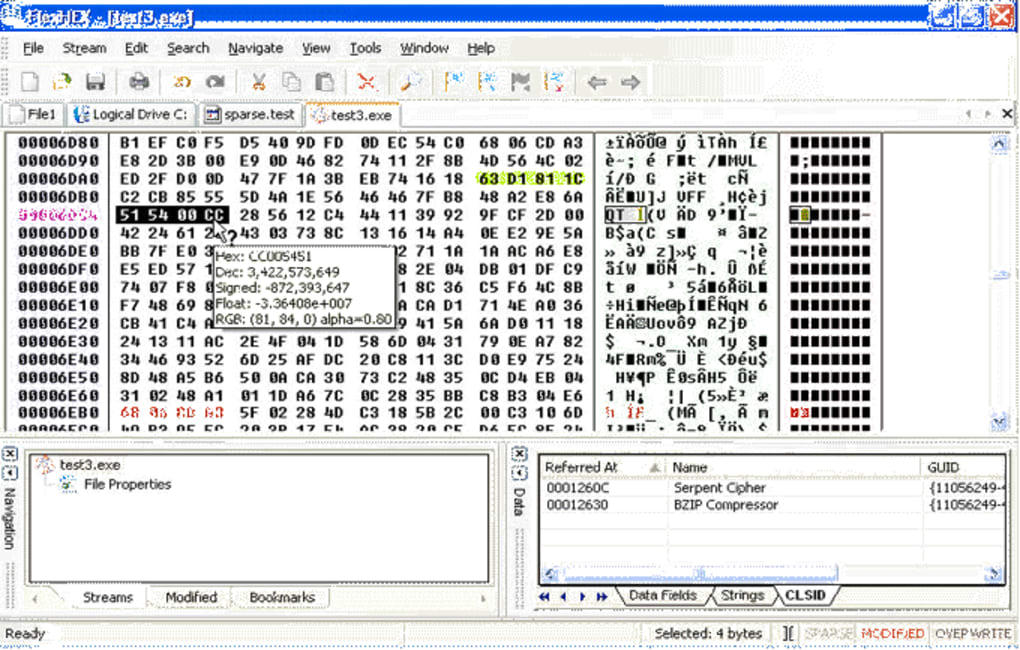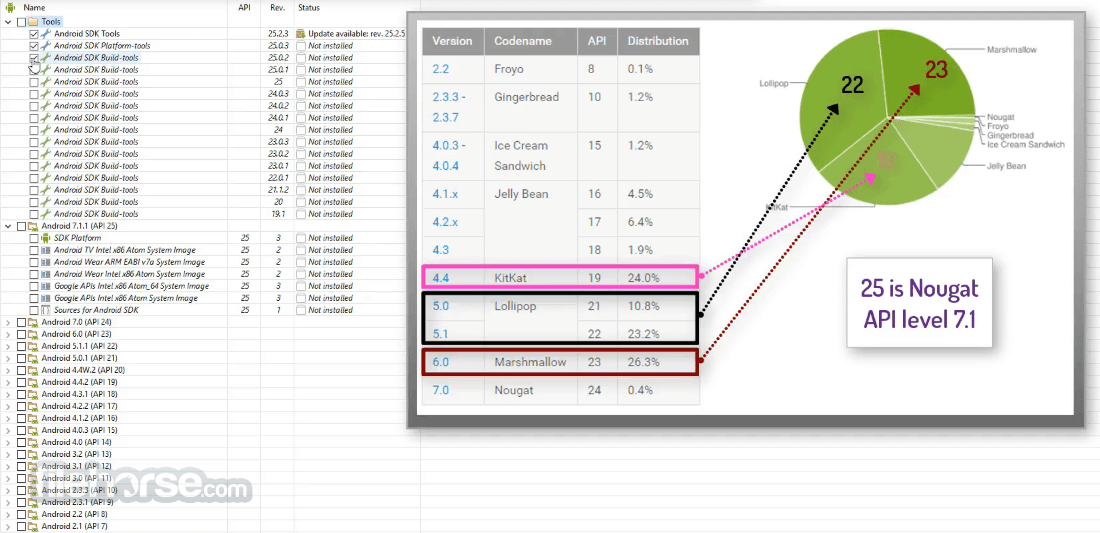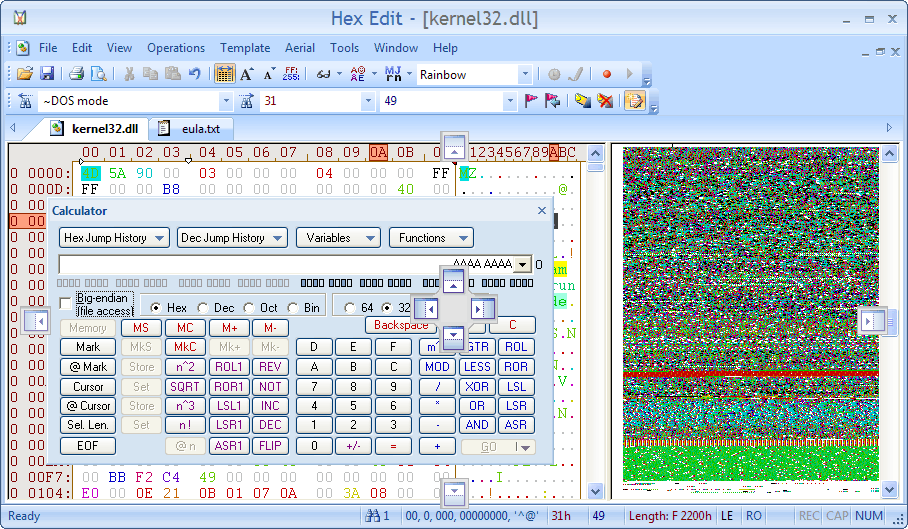Published on Thu, Dec 17, 2020 by doma team, working from Bristol, UK.
Hex editors are less-than-optimal tools. There i s no clear “winner” in terms of hex editors. The options are so abundant that most popular hex editors tend to be the worst in terms of stability and being able to handle large files. Besides, hex editors tend to be extremely byte-oriented, so for proper bitwise processing, you have to look. Notepad is a free (as in “free speech” and also as in “free beer”) source code editor and Notepad replacement that supports several languages. Running in the MS Windows environment, its use is governed by GNU General Public License.
TL;DR
- Simple binary patching and experimentation can be done with
wxHexEditor. - Erlang and Elixir are the only general-purpose programming languages that allow for binary pattern-matching, and should be used for functional and declarative binary editing.
- GNU poke is a domain-specific language for 'poking at binaries'. Different binary units (bits, bytes, uints, ints, structs) are supported natively and a genius mapping operator removes a lot of boilerplate when it comes to reading data into semantic structures and writing data out to memory or files.
There are different ways to structure data within a file.In the age of web, the most prominent one is JSON, followed by middle-aged XML and configuration-oriented YAML.Human-readable ways to structure data, however, are just one side of the spectrum.The other side is pure binary data mapped to some data structures to be computer-readable.Features like bit fields in C enable humans to define such mappings, but they also serve as a way to decode said structures.Wiki example, when compiled and disassembled doesn't mention BoxProps at all.Only when we add a function like the one below is included in the source code, would compiler spare some instructions to figure out where to get desired bits from.
Packing bits into structures warrants a whole separate post, but it's worth mentioning that bitfields is a controversial feature of C99 and many C developers suggest not using it in favor of using bitmaps and manually written packing / unpacking functions.One of the reasons for it is that it's not defined how the compiler packs bitfields, which means in practice, that some compilers reorder under-octet bitfields for the sake of optimisations.
Traditionally, non-human readable data is explored using hexdump or, less commonly xxd to print as binary instead of hex.Finally, there is od which defaults to decimal representation.But what if we need to edit it slightly for experimentation, error correction or binary carving?There is no single traditional tool for binary editing, but there's a range of tools, collectively called hex editors.
Shortcomings of hex editors
Sadly, most of readily available hex editors have two major shortcomings:
- They only work on bytes
- They rarely handle huge binary files in a responsive way
- Some of hex editors have stability issues, i.e. they crash a lot
The worst offenders for crashes are ghex and bless, with latter barely working at all.Which is funny, because these two editors are frequently suggested as the best out there.
Due to these circumstances, it's wise to stick to wxHexEditor for very basic inspection/interaction and neglect hex editors altogether when it comes to advanced processing.
Hands on!
Let's say we want to extract 7-bit ASCII from this file.To do this we need to take the last bit of every byte and shove it in the back of this binary.Here is a single-take attempt to do it with a hex editor:
Even if one knows what to do, it's less than trivial to not screw it up, especially while trying to save time on insertions of zeros.However, a hex editor is a great instrument to quickly validate that the method works and move on to more automated tools.
Binary processing with Erlang

My favorite tool to do binary processing with is Erlang.It has a minimalist Prolog-like syntax, but most importantly, native support to work with binaries, bitstrings, including binary pattern matching (see 'Examples' subsection).
To do with Erlang what we failed to do with hex editor, we will write the following program, following our hex editor attempt:
We call seven-bit clusters 'Hosts', and the appended bits, that we need to send to the back 'Guests'.
Here we use standard recursion with accumulator, which in our case is a tuple of Hosts and Guests.We bind current values of accumulator in (A) and update them in (B) and (C)/(D).
In (E), we match first byte of challenge with variables A (7 bits), and G (1 bit), and the rest of challenge gets matched with variable Rest.As you can see, in this context X:N syntax means 'match N bits of some binary value with variable X'.As opposed to a similar syntax you can see in (B) and (C), where syntax 0:1 means 'span decimal value 0 over 1 bits'.We specify that Rest variable is binary, not bitstring, to make sure it's byte-aligned.If it was bitstring, it would mean that it may be any amount of bits large, even seven or one.
Hosts update happens in (B) is that we take seven bits, pad it with a single 0 on the left and shove into the end of the first element of accumulator.
Dev C%2b%2b Hex Editor
Case statement in (F) checks if Guests accumulator variable is byte-aligned (its bit size is divisible by eight) or not.If it is, next iteration of Guests accumulator will be padded with a 0-bit, as seen in (C).If it isn't we just append the 'guest bit' to Guests accumulator verbatim, as seen in (D).
Finally, in (A), when the remaining set of bits is empty, we return concatenation of the two accumulator variables.
When we run it, we get the hidden message!

At the time of publishing of this post I thought that there is no way to express binary literals in Erlang, like in Python 0b101 5.However, as Reddit user Gwaerondor pointed out, it's possible with Radix#-syntax: 2#101 5.
GNU poke
Dev C++ Hex Editor Torrent
In 2017, thirty one years after Erlang's initial prototype, a tool whose sole purpose is working with structured binary data was conceived.It's called GNU poke, and its v1 got released just several days ago.Let's see how to use it for the same transformation:
One of the biggest powers of GNU poke is that you can define a structure and map it to some data in one swift motion with 'map' operator @:
I[] @ 0#B means 'map the contents of currently loaded IO space onto array of Is'.Now let's see how to write the solve script.
An interesting part of this function is (A), it uses binary concatenation operator :::. It can concatenate heterogenous binary data types like a bit and a 7-bit blob.
Then, (B) and (C) write out guest bits, following the same logic as in Erlang implementation.This is a pretty dense construction though, so let's read it together.bit[] @ fg : bitsWrote#b reads 'map an array of bits to fg with a bit offset of bitsWrote'.Now on the right hand side there is a value that will get mapped, which in (B) is two bits: 0-padding and the guest bit and in (C) just the guest bit.
Now the sadder bit is that (D) and (E): these files need to exist and contain enough data to map the outputs of the program, otherwise when ran, one'll get EOF exception.Here's how to run this solution: Download disciplina positiva pdf libro.
In conclusion, it seems like it's wise to use
- hex editors allow for quick manual exploration,
- erlang allows to follow functional style better,
- GNU poke is imperative and procedure-oriented, but gives
- more flexibility in literal representations
- allows for less boilerplate due to genius mapping operator

Of course, you can use all three at different stages of your work with binaries.
Good luck with binary exploration and happy hacking!
We all know that computers and digital machines work on binary digit principle. This is a language which is understandable but computing devices and consists of only two digits 0 and 1. Various combinations give different words that we humans can understand. Like binary code to show “a” on screen is 01000100. Well, now the library of the words is this vast that these binary digits arrange themselves and forms Hexadecimal digits. These digits are all over our device and are operating at each click, each word or anything we do on the computer or any digital device. To edit these codes, some softwares are made, and those are called Hex editors. These software are high-end softwares and are used by professionals. One can change the code of showing “a” using these software and pretty much, alter the whole operating system with it. The person must have a vast knowledge of Binary units to operate in the software. A list of free Hex editing software is provided from which you can choose whichever suits you the best. However, some of the software only come in a trial version for free and are purchasable later for full functionality.
1. Free Hex Editor Neo
The Free Hex Editor Neo is created by HDD software and is loaded with many features with a powerful engine. It can compile data of multi Giga-bytes in seconds, and the accuracy is mesmerizing. It readily supports Windows and is used by most professional reverse engineers. In the freemium version, you can Type, Cut, Paste, Copy, Insert, Delete, Fill, Import and Export and even try some advanced functions for your ease. This Hexadecimal software will blow your mind in terms of power, and the company says it has no competitor in the market for its speed. Try it for free.
Download: Windows
2. PSPad
PSPad is a very versatile hexadecimal text editor that is loaded with features. The software was made and published in 2001 and is still improving and adding new features by updates. The software is rivaling the market and comes in the top list. The software provides you with many features like full HEX editor, Support for Unicode, ANSI, ISO, OEM, Auto-Correction, Spell checking, Undo-Redo Operations and Unlimited length. The editor is available in two formats: as a setup file (installer) and a portable version (zip archive). You can download it free from the provided website and use it directly after installation.
Download: Windows
3. HxD
HXD is a high-quality freeware Hex editing software that is very dependable in terms of quality. The software is loaded with features and makes it easier for the user to create and edit text files. Features like searching and replacing, exporting, checksums/digests, insertion of byte patterns, a file shredder, concatenation or splitting of files, statistics and much more help you get your work done efficiently. It has unlimited support for length and it can open a file of any size larger than large.
Download: Windows
4. Hex Workshop
Pokemon multiverse gba rom download. Hex Workshop is software by Breakpoint software which provides you with lots of Hex editing tools and readily supports Windows. The company keeps improving the software and it is already in a shape in which any user can use it without any trouble. Reverse engineering of software is very complicated and must be pinpoint accurate to provide results; this software helps you achieve that landmark and gets your project to be completed successfully in time with accuracy. The features of this software are very vast, and you can see a list of them on the official website.
Download: Windows

5. Free Hex Editor (frehed)
Frhed – free hex editor is an open-source binary file editor that supports only previous version Windows like Windows 95/98/Nt4. It is a 100% free Hex Editor and good in quality relatively. Features include Cut and Paste (for Binary and text data), find and replace (binary and/or text), file comparison, customizable colors and font (ANSI or OEM display), bookmarking and some more. Thus, it is the basic software that goes straight for the binary related work and no other functionalities to alter the text.

Download: Windows
6. UltrEdit
UltrEdit is a top-rated text editing software that can pretty much open any text format file. Editing Hexadecimal is also available in this software, and with its broad library of functions, it becomes easy to edit Hex text and compile it. The software is unmatched in terms of text editing and is offering a free trial version with many essential functions, which can be later purchased. Its features are: Easily open and edit large files – 4 GB and beyond, Multi-caret editing and multi-select, Code syntax highlighting for nearly any programming language, Auto-closing XML/HTML tags, File and data sorting and many more.
Dev C++ Hex Editor Download
Download: Windows